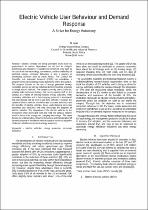JavaScript is disabled for your browser. Some features of this site may not work without it.
- ResearchSpace
- →
- Research Publications/Outputs
- →
- Conference Publications
- →
- View Item
| dc.contributor.author |
Isaac, Nithin

|
|
| dc.date.accessioned | 2021-03-07T18:12:45Z | |
| dc.date.available | 2021-03-07T18:12:45Z | |
| dc.date.issued | 2020-01 | |
| dc.identifier.citation | Isaac, N. 2020. Electric vehicle user behaviour and demand response. http://hdl.handle.net/10204/11832 . | en_ZA |
| dc.identifier.uri | http://hdl.handle.net/10204/11832 | |
| dc.description.abstract | Electric vehicles are being promoted world-wide by governments to reduce dependence on oil and to mitigate greenhouse gas emissions. In addition to barriers to entry such as the cost of the new technology, convenience, and the availability of electrical energy, consumer behaviour is also a concern in developing countries such as South Africa. The Council for Scientific and Industrial Research (CSIR) has established a program aimed at promoting energy autonomy within the campus. The program focuses on the use of energy generated through renewable sources as well as initiating demand response activities to charge electric vehicles. The campus currently owns 10 electric vehicles both hybrid and battery, that can be used by staff on the campus as a means of striving towards energy autonomy. With increasing utilisation and a fast-charging system it is envisioned that more people will be keen to use these vehicles. However, the uptake of electric vehicles are tied to also consumer behaviour and the benefits of electric vehicles, hence understanding consumer awareness and behaviour will help encourage the adoption of electric vehicles. The integration of the electric vehicles to the envisioned smart micro-grid will also help the campus become smart in terms of its energy use, charging and storage. The paper focuses on understanding consumer behaviour and incorporation of demand response in the electric vehicle space to maximize adoption of electric vehicles and promote energy autonomy. | en_US |
| dc.format | Fulltext | en_US |
| dc.language.iso | en | en_US |
| dc.relation.uri | https://www.saiee.org.za/displaycustomlink.aspx?name=SAUPEC2020 | en_US |
| dc.source | SAUPEC/RobMech/PRASA, University of Cape Town, 29-31 January 2020 | en_US |
| dc.subject | Consumer behaviour | en_US |
| dc.subject | Energy autonomy | en_US |
| dc.subject | Electric vehicles | en_US |
| dc.title | Electric vehicle user behaviour and demand response | en_US |
| dc.type | Conference Presentation | en_US |
| dc.description.pages | 7pp | en_US |
| dc.description.note | Paper presented at SAUPEC/RobMech/PRASA, University of Cape Town, 29-31 January 2020 | en_US |
| dc.description.cluster | Smart Places | |
| dc.description.impactarea | Campus Master Plan | en_US |
| dc.identifier.apacitation | Isaac, N. (2020). Electric vehicle user behaviour and demand response. http://hdl.handle.net/10204/11832 | en_ZA |
| dc.identifier.chicagocitation | Isaac, Nithin. "Electric vehicle user behaviour and demand response." <i>SAUPEC/RobMech/PRASA, University of Cape Town, 29-31 January 2020</i> (2020): http://hdl.handle.net/10204/11832 | en_ZA |
| dc.identifier.vancouvercitation | Isaac N, Electric vehicle user behaviour and demand response; 2020. http://hdl.handle.net/10204/11832 . | en_ZA |
| dc.identifier.ris | TY - Conference Presentation AU - Isaac, Nithin AB - Electric vehicles are being promoted world-wide by governments to reduce dependence on oil and to mitigate greenhouse gas emissions. In addition to barriers to entry such as the cost of the new technology, convenience, and the availability of electrical energy, consumer behaviour is also a concern in developing countries such as South Africa. The Council for Scientific and Industrial Research (CSIR) has established a program aimed at promoting energy autonomy within the campus. The program focuses on the use of energy generated through renewable sources as well as initiating demand response activities to charge electric vehicles. The campus currently owns 10 electric vehicles both hybrid and battery, that can be used by staff on the campus as a means of striving towards energy autonomy. With increasing utilisation and a fast-charging system it is envisioned that more people will be keen to use these vehicles. However, the uptake of electric vehicles are tied to also consumer behaviour and the benefits of electric vehicles, hence understanding consumer awareness and behaviour will help encourage the adoption of electric vehicles. The integration of the electric vehicles to the envisioned smart micro-grid will also help the campus become smart in terms of its energy use, charging and storage. The paper focuses on understanding consumer behaviour and incorporation of demand response in the electric vehicle space to maximize adoption of electric vehicles and promote energy autonomy. DA - 2020-01 DB - ResearchSpace DP - CSIR J1 - SAUPEC/RobMech/PRASA, University of Cape Town, 29-31 January 2020 KW - Consumer behaviour KW - Energy autonomy KW - Electric vehicles LK - https://researchspace.csir.co.za PY - 2020 T1 - Electric vehicle user behaviour and demand response TI - Electric vehicle user behaviour and demand response UR - http://hdl.handle.net/10204/11832 ER - | en_ZA |
| dc.identifier.worklist | 23084 | en_US |






